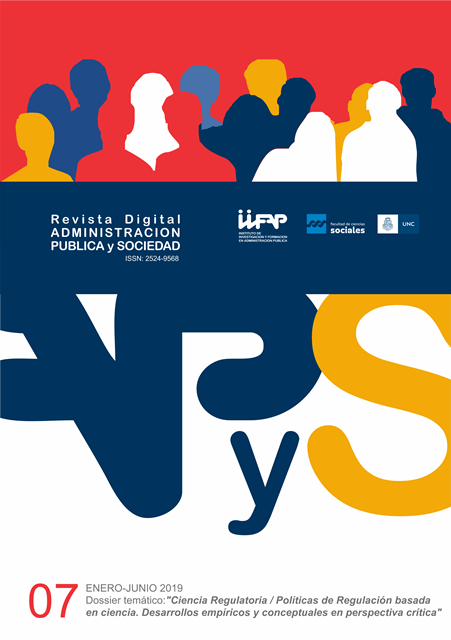Mobilising scientific expertise against trade restrictions. A case of dispute over the regulation of gmos at the world trade organization
Main Article Content
Abstract
The World Trade Organization (WTO) dispute settlement procedure is a key area for establishing global legal standards for what is considered relevant knowledge. As a high-profile case, the WTO trade dispute over GMOs mobilized and appropriated scientific knowledge in somewhat novel ways. The Panel interpreted the Sanitary and Phitosanitary Agreement (SPS)framework as a requirement for "risk assessment", i.e. the quantification of probabilities and consequences, and the imposition of additional burdens on the defendant for the production of evidence. By imposing "the most restricted applications to date of the notion of SPS risk assessment" (Peel, 2010: 244), the WTO Panel further globalized a "science-based risk assessment" that had emerged during the Reagan administration of the United States (Jasanoff, 2011).From the outset, the Panel placed the dispute under the Sanitary and Phytosanitary Agreement (SPS) through a new legal ontology; classified transgenes as potential pests; and limited all environmentalissues to the category of "plant and animal health. Within the SPS framework, which focused on the respondent's regulatory procedures, the Panel organized scientific expertise specifically to establish how the experts were to be questioned, the answers they would give, their specific role in the legal arena, and how their statements would complement the Panel's findings.In addition, the Panel gave a procedural twist to WTO jurisprudence by presenting its findings as a purely legal-administrative judgment on whether EC regulatory procedures violated the SPS Agreement. In the meantime, the Panel implicitly maintained its own judgments on substantive risk issues. As this case illustrates, the WTO dispute settlement process creates new scientific experience for the main task of challenging trade restrictions as overly cautious.
Article Details

This work is licensed under a Creative Commons Attribution-NonCommercial-ShareAlike 4.0 International License.
Authors who publish in this journal accept the following terms of the copyright policy:
- Authors shall retain their copyright (including copyrights) and shall grant to the journal the right of first publication of their work, which shall simultaneously be subject to the Creative Commons Recognition License: No commercial use of the original work or any derivative works is permitted, distribution of which must be made under a license equal to that which governs the original work.
- Authors may adopt other non-exclusive license agreements for the distribution of the version of the published work (e.g., placing it in an institutional repository or publishing it in a book) provided that the initial publication in this journal is indicated.
- Authors are allowed and encouraged to disseminate their work through the Internet (e.g., in institutional repositories or on their website) after the publication process, which may lead to interesting exchanges and increased citations of the published work. (See The Effect of Open Access).
How to Cite
References
Boisson de Chazournes L, Mbengue Makane M and Thomas U (2009) Réflexions sur la relation entre la science, l'incertitude scientifique et l'Accord sur les mesures sanitaires et phytosanitaires (SPS), in R. Trigo Trindade et al. (eds), Liber Amicorum – Anne Petitpierre-Sauvain: Economie, environnement, éthique: de la responsabilité sociale et sociétale. Genève: Schulthess: 43-56.
Busch, Lawrence, Grove-White, Robin, Jasanoff, Sheila, Winickoff, David and Wynne, Brian (2004) Amicus Curiae Brief Submitted to the Dispute Settlement Panel of the WTO in the Case of EC- Biotech (WT/DS291, 292 and 293). Available at http://www.ecolomics- international.org/biosa_ec_biotech_amicus_academic2_ieppp_lancasteru_coord_0404.pdf
Christoforou T (2000) Settlement of science-based trade disputes in the WTO: A critical review of the developing case law in the face of scientific uncertainty. New York University Environmental Law Journal 8(3): 622-649.
Edmond G (2002) Legal engineering: Contested representations of law, science (and non-science) and society. Social Studies of Science 32(3): 371-412.
Jasanoff S (1995) Science at the Bar: Law, Science, and Technology in America. Cambridge, MA: Harvard University Press.
Jasanoff S (2011) The practices of objectivity in regulatory science. In: Camic C, Gross N and Lamont M (eds) Social Knowledge in the Making. Chicago: University of Chicago Press, 307-337
Leclerc O (2007) Scientific expertise and judicial decision-making: Comparative insights. In: Ferrer Beltrán J and Pozzolo S (eds) Law, Politics, and Morality: European Perspectives III. Ethics and Social Justice. Berlin: Duncker & Humblot, 15-26.
Levidow L and Carr S (2010) GM Food on Trial: Testing European Democracy. London: Routledge. Pauwelyn J (2002) The use of experts in WTO dispute settlement. International and Comparative Law
Quarterly 51: 325-364.
Peel J (2006) A GMO by any other name ... might be an SPS risk!: Implications of expanding the scope of the WTO Sanitary and Phytosanitary Measures Agreement. European Journal of International Law 17: 1009-1031.
Peel J (2010) Science and Risk Regulation in International Law. Cambridge: Cambridge University Press.
USTR (2004a) First Submission of the United States. Office of the United States Trade Representative (21 April). Available at: http://www.ustr.gov/webfm_send/184
USTR (2004b) Supplementary Rebuttal Submission of the United States. Office of the United States Trade Representative (15 November). Available at: http://www.ustr.gov/webfm_send/180 (accessed 23 September 2011).
Walker V R (1998) Keeping the WTO from becoming the ‘World Trans-science Organization’: Scientific uncertainty, science policy, and fact finding in the growth hormones dispute. Cornell International Law Journal 31: 251-320.
WTO (1994) The WTO Agreement on the Application of Sanitary and Phytosanitary Measures. Geneva: World Trade Organization.
WTO (1998) Appellate Body Report, European Communities – Measures Concerning Meat and Meat Products. Geneva: World Trade Organization. Available at: http://www.wto.org/english/tratop_e/dispu_e/cases_e/ds48_e.htm
WTO (2006) European Communities – Measures Affecting the Approval and Marketing of Biotech Products. Reports of the Panel. Geneva: World Trade Organization. (http://www.wto.org/english/tratop_e/dispu_e/cases_e/ds291_e.htm).
WTO (2008) United States – Continued Suspension of Obligations in the EC – Hormones Dispute. Report of the Appellate Body (16 October, 2008, WT/DS320/AB/R; http://www.wto.org/english/tratop_e/dispu_e/ab_reports_e.htm; checked, 23 October 2011).
Yerxa R H and Wilson B (eds) (2005) Key Issues in WTO Dispute Settlement: The First Ten Years. Cambridge: Cambridge University Press.

